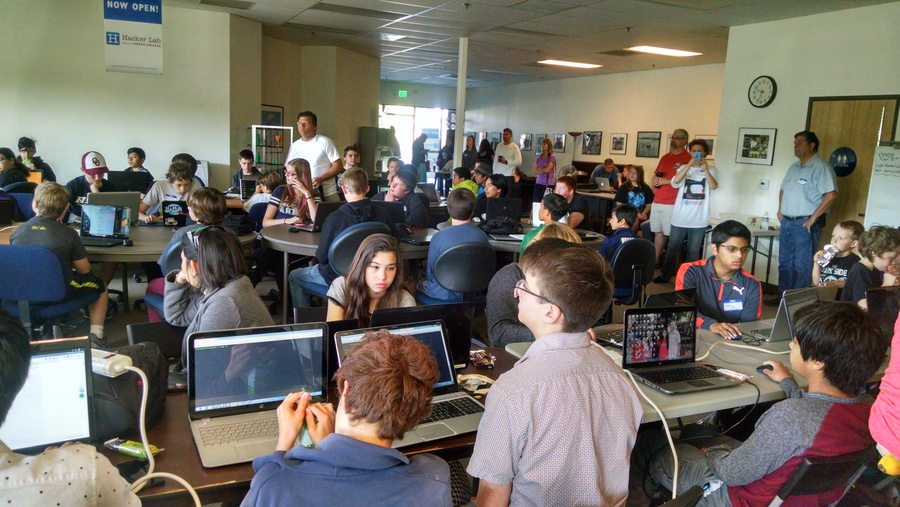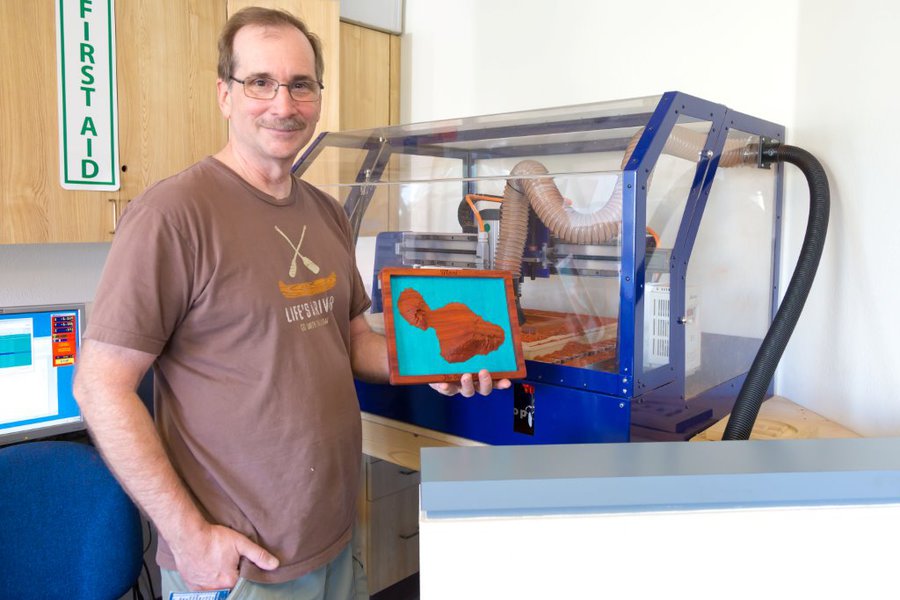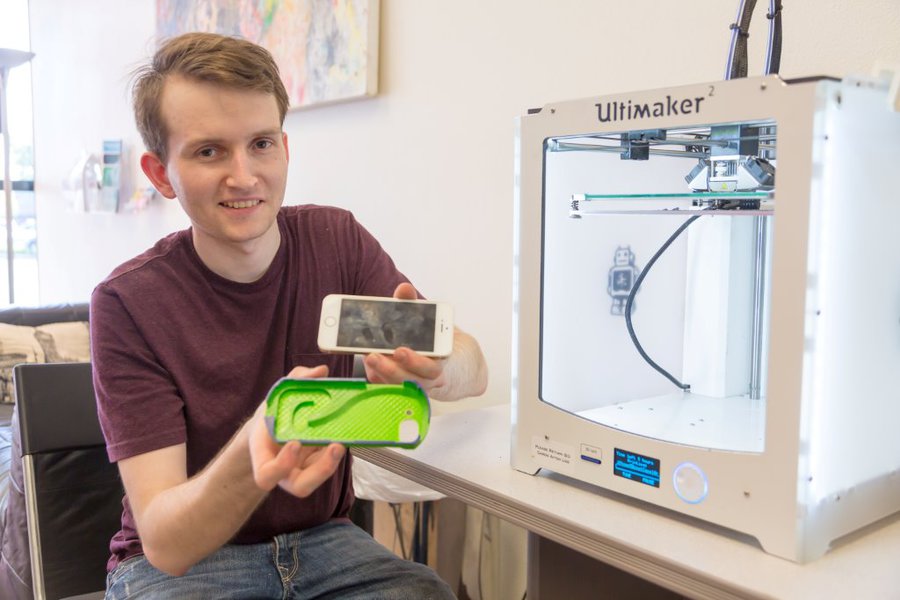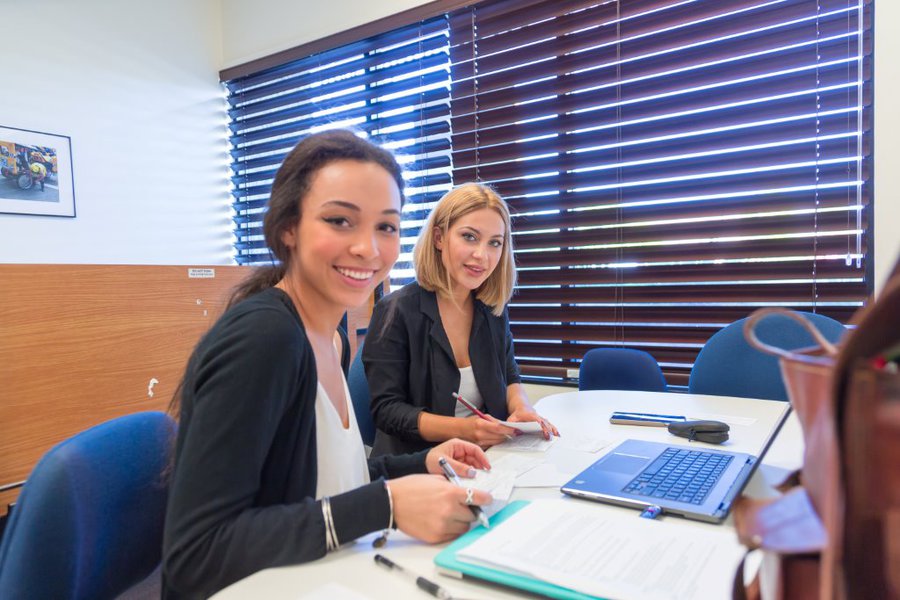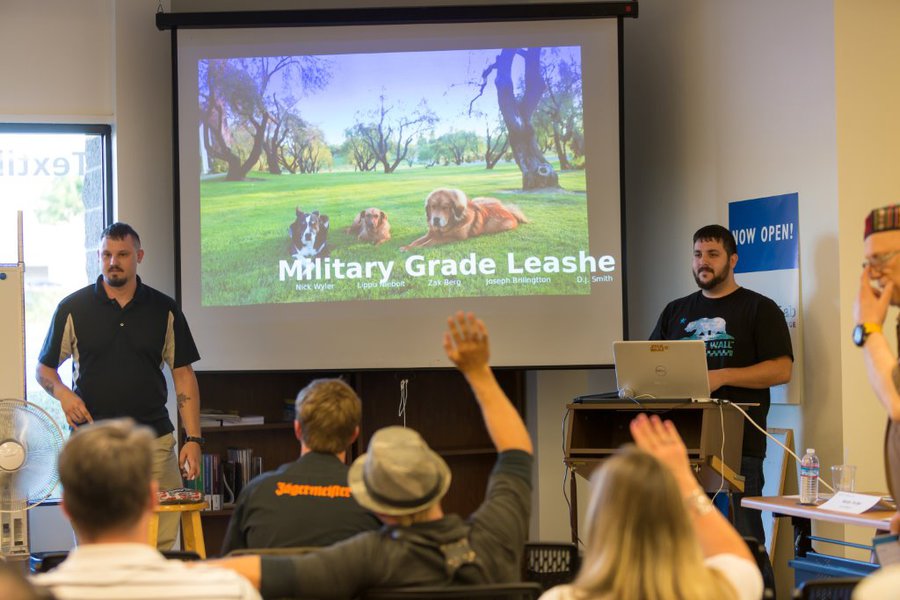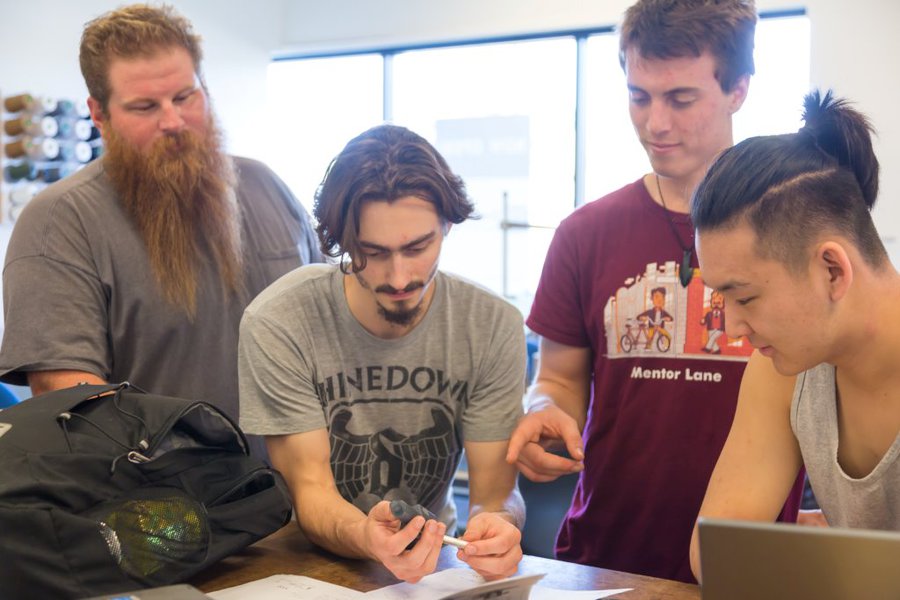Makerspace Profile
Overview
Hacker Lab is a makerspace and coworking space; an economic catalyst for start-ups and micro-businesses; a place where one can go to learn, create new products or technologies; and a community of diverse minds, skills and interests that reflects a growing and passionate Creative Class. Started four years ago in downtown Sacramento, Hacker Lab is hip, shows contagious entrepreneurial energy, and promotes a culture based on human connections, shared learning and kind respect.
It is also the first private makerspace and co-working space in the country to form a public-private partnership with a community college. Why would a fast moving, organic, free-spirited business join forces with a public institution built on tradition, rules and law? In Sierra College’s case, this partnership developed in true Hacker Lab style – grown from the community and supported by forward-thinking leaders.
Three years ago, Hacker Lab CEO Gina Lujan and Sierra College President/Superintendent Willy Duncan participated in the regional ‘Cap-to-Cap’ trip organized by the Sac Metro Chamber. Drexel University in Philadelphia was one of the stops where attendees toured the innovation space and learned how students were benefiting from the on-campus lab. Gina pointed out that Sacramento had Hacker Lab and other developing spaces – reflecting a growing community of makers, coders, tinkerers, community-builders and young adults interested in pursuing their creative ideas in the company of their peers! Seeing Drexel’s innovation space opened awareness to the work that Hacker Lab was doing – attracting and supporting creative workers and entrepreneurs right here at home.
In fall 2014, Hacker Lab co-founders Eric Ullrich and Charles Blas met with the Sierra College team of faculty, staff and managers, as well as the executive leadership, to tour the campus and discuss how a partnership might be structured. Sierra College wanted a makerspace near the campus that followed the Hacker Lab ethos of ‘open’, ‘creative’, and ‘collaborative.’ Hacker Lab wanted a partner who would help them expand and connect to a wider community. A Memorandum of Understanding was struck and formally adopted by the Sierra College Board of Trustees. Work began on opening a new makerspace in Rocklin, located in a commercial shopping center approximately one-half mile from campus.
Just one day after the landlord handed over the keys, Hacker Lab held its first workshop at the Rocklin site. More than 45 people traveling from Sacramento, the Bay Area and other communities attended the world tour launch of Intel’s RealSense technology. Attendees received hardware and software, with the intent that they would – without the expectation of money or fame – develop applications to demonstrate the capabilities of RealSense.
Community Meet Ups and classes over the next few months showed that there was local support. A Meet Up at a nearby brewery attracted 150 people and packed the house. The Grand Opening on May 7, 2015 saw more than 400 attendees; a response unlike any other for a business opening in Rocklin. Memberships at the Rocklin site hit the 100 mark in less than 6 months and currently stands at over 250. Fifty percent of members are Sierra College students; recruitment campaigns are ongoing.
With support from the Sierra College Center for Applied Competitive Technologies and the Business & Technology Division, events have included:
• Youth Hack-a-thons and classes for middle and high school students.
• A StartUp Hustle bootcamp for entrepreneurs. Participants pitch their concepts on Demo Night at an open house event.
• Presentations by business leaders such as Mark Randall, Chief Strategist and VP of Creativity, Brook Drumm, Founder of PrintrBot, Jasan Singh, Founder of Clover, and Josh Klint, Founder of Leadwerks.
• Faculty professional development workshops such as digital design and printing, and “Making Across the Curriculum.”
• More than 30 classes every month including Virtual Reality design/programming, laser cutting, ShopBot, Industrial Sewing, Arduino, 3D Printing and Metalworking.
Sierra College instructional programs have started integrating updated technologies and instructional practices into the curriculum. An example is the use of Adobe’s Kickbox, an open-source innovation process, into Business Entrepreneurship classes. Faculty received training by Kickbox founder, Mark Randall, Adobe’s Chief Strategist and VP for Creativity with the proviso that the curriculum be shared openly. That he knows of, Mr. Randall believes that Sierra College is the first educational institution in the country to use Kickbox. At a May 12, 2016 Entrepreneurs Showcase, student teams that completed the Kickbox process pitched their ideas to a team of judges and won prizes, sponsored by U.S. Bank. These competitions will be held each semester.
In March 2015, the City of Rocklin became a key partner by designating the triangle connecting City Hall, Hacker Lab Rocklin, and the College as an Innovation District. Hacker Lab Powered by Sierra College was identified as a key component in supporting the City’s economic vitality, and Willy Duncan was praised for reaching out and engaging the community.
The partnership of the three entities meets regularly to share information and discuss opportunities for collaboration. As an example, the City’s Parks & Recreation Department and the Placer County Tourism Bureau held a “Mini-Maker Faire” on the Sierra College campus in October 2015, attracting more than 7,000 residents – a remarkable response for a first-time event. Hacker Lab was there in force, making projects and demonstrating technologies such as 3D printing. The College’s Career & Technical Education programs, as well as makers and creatives from the region also came to engage the community. In 2016, the City is holding another Mini-Maker Faire, again on the Sierra College campus.
The Hacker Lab-Sierra College partnership is seen as a model by the California Community College Chancellor’s Office, Workforce and Economic Development Division. Gina Lujan along with Dr. Sonja Lolland, Dean of Business & Technology, and Carol Pepper-Kittredge, Director of the Center for Applied Competitive Technologies, advised the California Council on Science & Technology in the development of a white paper, exploring the value of community college makerspaces in preparing students for the workforce of the future. The white paper, published in April 2016, recommends the engagement of California Community Colleges in developing makerspaces as a key instructional strategy. The Chancellor’s Office simultaneously announced a $17m InnovationMaker 3 initiative to accelerate a statewide effort.
Access
Hacker Lab Powered by Sierra College is membership-based; Sierra College supports facility and equipment costs and Hacker Lab manages day-to-day operations. Once a member is on-boarded, access to the space is 24/7 with the use of a door fob.
Tools, Materials and Resources
• Shopbot CNC Router - desktop
• 3D Printers – Stratasys u-Print, Ultimaker 2, Altair, Formlabs, PrintrBot
• Universal Laser Cutter – 80 Watt, 18×36″ cutting bed
• Textile Lab – Juki single needle, Brother Overlock, Pegasus Coverstitch, Juki Coverstitch, Atlas Zig-zag, Juki Merrow, Walking foot, Nakajima Leather cylinder arm needle feed
• Design Computer Stations – Equipped with CAD software and Adobe Suite
• Electronics Lab – Soldering stations, components and supplies, oscilloscope
• Virtual Reality Lab (new) – Occulus Rift, computer hardware and software
Vinyl Cutter - Roland
• Fabrication and assembly shop – Assorted woodwork and metalworking tools including table saw, chop saw, benchtop lathe and mill, drill press & hand tools
Coworking space – including presentation spaces (screens, projector, white boards)
Access & Usage Costs
Sierra College students have a reduced monthly membership rate of $12.50 and faculty has a reduced rate of $50 per month.
Meet Ups are open to the public and are free to attend. Other free events include open house nights, Demo Nights, community and college-sponsored events.
Community members can take single classes (without joining as a member). Prices are based on the length of the class and any materials costs.
Regular member rates, established by Hacker Lab, are $99 per month. More information is available at hackerlab.org
Management
In accordance with a Memorandum of Understanding, approved November 2014, Hacker Lab manages the makerspace. Staff, volunteers and facilitators/teachers are interviewed, selected and managed by Hacker Lab. The space is open 24/7 and has on-site management during regular business hours, M-F. A security camera system is in place. Members who are on-boarded are coached on the culture of ‘this is our collective space, and we all take care of it.’ Facilities are cleaned and labs are kept tidy by staff, volunteers and members. Equipment is maintained by highly skilled facilitators and each lab generally has a ‘champion’ to provide oversight. The Sierra College Center for Applied Competitive Technologies provides support for maintaining equipment owned by the College.
Training
More than 30 classes are offered each month in a wide variety of topics, including Arduino, Industrial Sewing, Metalworking, ShopBot, and Virtual Reality. A real-time calendar of classes is available at hackerlab.org.
Additional opportunities include joining MeetUp groups that meet at the facility and on the Sierra College campus, and special events including youth hackathons, Vex Robotics Challenges, StartUp Hustle Demo nights, student Entrepreneur Showcase competitions, faculty professional development events such as Making Across the Curriculum.
Use and Activity
A representative description of how the space is used includes:
A typical offering of skills classes – Woodworking 101, Intro to Laser Cutting, ShopBot 101 and 201, Introduction to Arduino, SacRuby, 3D CAD, 3D Printing, Business & Law Bootcamp, Industrial Sewing, Introduction to Metalworking, Introduction to Word Press, Introduction to Raspberry Pi, Easy 2D Games for ios and Android, Virtual Reality Development, Intro to HTML and CSS, Growing Web Traffic with SEO, Kids Learn Java Script in Mine Craft, Making 3D Images on the Form 1 Resin Printer, Corel Draw 101, and Learn to Solder.
Competitions and accelerators:
• Spring StartUp Hustle – six week ‘idea to concept’ training and mentoring for entrepreneurs, Demo Night for final presentations.
• Operation Innovate youth hackathon
• VEX Robotics Challenge
Professional Development:
• Teacher Hackathon – Placer Co. Office of Education and Spark Fun
• Adobe Kickbox – Mark Randall
• Sierra College Career and Technical Education Advisory Meetings
Public Events:
• President’s Breakfast
• Cap-to-Cap College and Chamber reception
• Nontraditional Employment for Women (high school girls) breakout session
• Meet Ups – examples include Ham Radio, Virtual Reality, Ruby on Rails, Code Slingers
• Youth summer camps
Culture and Community
Hacker Lab Powered by Sierra College was designed to benefit faculty, students, businesses and entrepreneurs, and be the first public-private community college partnership of its kind in the country. Entrepreneurial by design, the partnership offers 24-7 access to a collaborative learning environment where skill and inspiration offer co-creating opportunities, unhindered laboratory access, and supportive services for new and emerging businesses.
Hacker Lab founders, Gina Lujan and Eric Ullrich, define and maintain the culture of the space which can be described as communal, empowering, interdisciplinary, diverse, open-source, creative, fun, and entrepreneurial. New members attend an orientation session to convey these values, and volunteers and teachers are trained to communicate and demonstrate shared, collective, and collaborative behaviors and practices.
Stories that show this collective culture:
http://www.thepresstribune.com/article/8/19/15/area-hacker-lab-captivates-roseville-kids
https://www.youtube.com/watch?v=YbjaEFoNaLc
http://www.comstocksmag.com/qa/tech-all
Challenges and Lessons Learned
Culture Clash – Educational institutions are designed to be stable, and to change slowly and carefully. As an example, our curriculum approval process can take up to two years! Hackerspaces and makerspaces are designed to be flexible and move quickly, and there is a strong culture of ‘self-learn’ or peer-based learning without the need for a formal degree or certificate. We addressed this gap by engaging a diverse representation of faculty, staff and administrators who embraced the partnership and could influence peer and governance groups. These included early adopters who integrated new technologies and methodologies into curriculum; hosted crowdfunding, design thinking, lean start up, and other leading edge speakers; taught short term classes for Hacker Lab; and took on the role of ‘champion’ for sections of the lab space.
Student Engagement – there are advantages and disadvantages to having a makerspace at an off-campus location. Community stakeholders see the off-campus site as beneficial and commend the College’s willingness to reach out to engage business, local government, and residents. Students like the 24/7 access, especially during mid-term and finals when study groups can meet day or night, or where students can 3D print parts and build electronic assemblies for projects. Located about one-half mile from campus, it is important to ‘drive’ students over visit and join the makerspace given the geographic separation. We’re exploring ways to institutionalize this, including field trips, student-sponsored memberships affiliated with class projects and competitions, and student-lead interest groups.
Economic Sustainability – creating and maintaining makerspaces that are valued by users/members requires investment (e.g. appropriate workspace, Internet access, tools, equipment, classes, special events). Dynamic spaces need to be owned and supported by the regional ecosystem of businesses, nonprofits, foundations, schools, governments, residents, requiring the engagement of many and multiple partners. Sierra College and Hacker Lab are addressing this together, and have formed partnerships to diversify sources of funding and support. Funding sources include grants, earned income, membership fees, class fees, donations, in-kind support and services, and sponsorships.
Advice to other Makerspaces
Visit us, and visit others! Email cpepper-kittredge@sierracollege.edu and we’ll share any and all information and examples that we have. Find good partners – we are extraordinarily fortunate to have Hacker Lab as our partner. Assemble a college workgroup that includes faculty, staff and administrators. Learn and watch all things Dale Dougherty, the founder of Make Magazine and the Maker Faire.

